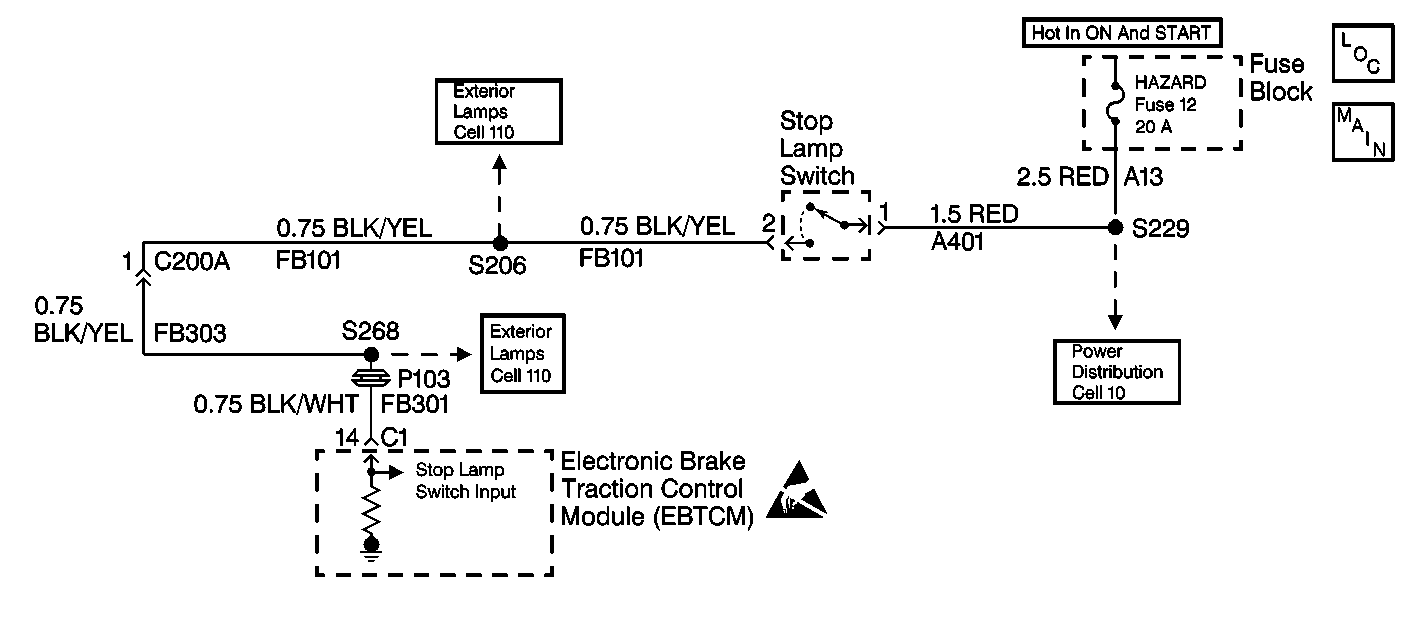
Circuit Description
The Stoplamp Switch is a normally open switch, when the brake pedal is depressed, the EBTCM senses battery voltage. This allows the EBTCM to determine the state of the brake lamp circuit.
Conditions for Setting the DTC
| • | EBTCM detects battery voltage at all times. |
| • | EBTCM never detects battery voltage from the stoplamp switch input circuit. |
| • | Both brake lamps are faulty. |
Action Taken When the DTC Sets
| • | DTC C0161 is set. |
| • | ABS and TCS remains active. |
Conditions for Clearing the DTC
| • | The condition responsible for setting the DTC no longer exists and the scan tool Clear DTCs function is used. |
| • | 100 ignition cycles pass with no DTC(s) detected. |
Diagnostic Aids
| • | It is very important that a thorough inspection of the wiring and connectors be performed. Failure to carefully and fully inspect wiring and connectors may result in misdiagnosis, causing part replacement with reappearance of the malfunction. |
| • | Thoroughly inspect any circuitry that may be causing the complaint for the following conditions: |
| - | Backed out terminals |
| - | Improper mating |
| - | Broken locks |
| - | Improperly formed or damaged terminals |
| - | Poor terminal-to-wiring connections |
| - | Physical damage to the wiring harness |
| • | The following conditions may cause an intermittent malfunction: |
| - | A poor connection |
| - | Rubbed-through wire insulation |
| - | A broken wire inside the insulation |
| • | If an intermittent malfunction exists refer to Intermittents and Poor Connections Diagnosis in Wiring Systems for further diagnosis. |
Test Description
The numbers below refer to the step numbers on the diagnostic table.
Step | Action | Value(s) | Yes | No | ||||
|---|---|---|---|---|---|---|---|---|
1 | Was the Diagnostic System Check performed? | -- | ||||||
2 | Observe the rear brake lamps. Are the brake lamps off? | -- | ||||||
3 | Disconnect the Stoplamp Switch connector. Are the brake lamps on? | -- | ||||||
4 | Press the brake pedal. Do the brake lights come on? | -- | ||||||
Is the voltage within specifications? | Battery voltage | |||||||
6 | Replace the EBTCM. Refer to Electronic Brake and Traction Control Module Replacement . Is the replacement complete? | -- | -- | |||||
7 | Repair the open or high resistance in the stoplamp switch input circuit. Refer to Wiring Repairs in Wiring Systems. Is the circuit repair complete? | -- | -- | |||||
8 | Check the HAZARD FUSE 12 in the Fuse Block. Is the fuse OK? | -- | ||||||
9 |
Is the voltage within specifications? | Battery voltage | ||||||
10 | Repair the open in the stoplamp CKT between the stoplamp switch and the HAZARD FUSE 12. Refer to Wiring Repairs in Wiring Systems. Is the circuit repair complete? | -- | -- | |||||
Connect a fused jumper wire between the Stoplamp Switch harness connector terminals 1 and 2. Do the brake lamps come on? | -- | |||||||
12 | Adjust or replace the Stoplamp Switch as necessary. Refer to the appropriate procedure.
Is the repair complete? | -- | -- | |||||
13 |
Is the fuse OK? | -- | ||||||
14 | Repair the short to ground in the stoplamp circuit between the stoplamp switch and the HAZARD FUSE 12. Refer to Wiring Repairs in Wiring Systems. Is the circuit repair complete? | -- | -- | |||||
15 |
Is the fuse OK? | -- | ||||||
16 |
Is the fuse OK? | -- | ||||||
17 | Repair the short to ground in the stoplamp switch input circuit. Refer to Wiring Repairs in Wiring Systems. Is the circuit repair complete? | -- | -- | |||||
18 | Repair the stoplamp switch circuit for a short to voltage. Refer to Wiring Repairs in Wiring Systems. Is the repair complete? | -- | -- |
